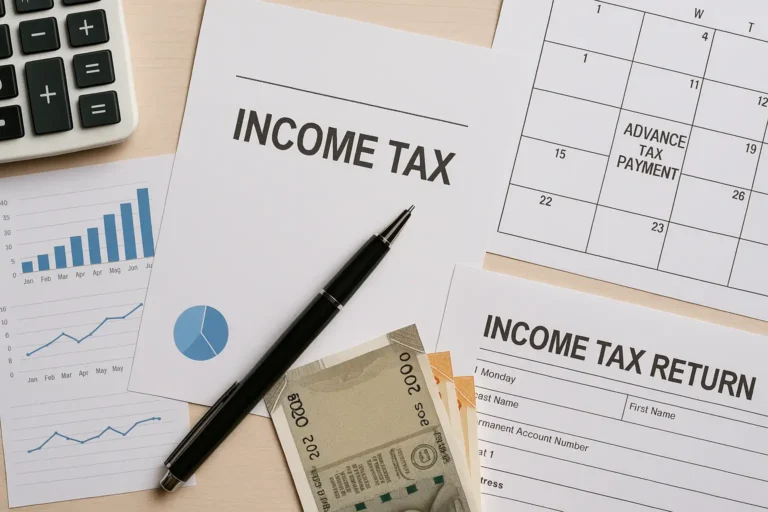Advance Tax is the income tax you submit to the government in advance, rather than paying it in one lump sum at the end of the financial year. It’s also called the “pay-as-you-earn” system because you submit your taxes in periods during the year, as you earn income.

Who All Need to Pay Advance Tax?
- Individuals (Salaried / Self-Employed / Professionals / Business Owners)
If your total tax liability in a financial year is ₹10,000 or higher after correcting for TDS.Although TDS is typically withheld from salaries, persons who receive additional income (such as rent, capital gains, interest, freelancing, or company revenue) can still be required to pay advance tax.
- Businesses / Companies
Any business, including companies, firms, LLPs, etc., with tax liability exceeding ₹10,000 in a financial year.
- Professionals (Doctors, Lawyers, Consultants, Freelancers, etc.)
Those earning income where tax is not fully deducted at source.
- Taxpayers with Capital Gains, Lottery Income, or Other Windfall Income
Since these earnings typically aren’t covered by TDS, advance tax must be paid if the liability exceeds ₹10,000.
How to Calculate Advance Tax
Step 1: Estimate your total income
Step 2: Deduct exemptions and deductions
Step 3: Compute your tax liability
Step 4: Adjust TDS and reliefs
Step 5: Pay in installments as per due dates
Advance Tax is paid in four installments during the year.
How to Pay Advance Tax?
Advance Tax can be paid easily online or offline.
- Online Payment
- Visit the Income Tax e-filing portal → e-Pay Tax.
- Select Challan ITNS 280.
- Enter PAN, Assessment Year, and choose Advance Tax (100).
- Pay using Net Banking, Debit Card, UPI, etc.
- On success, you’ll get a Challan Identification Number (CIN) as proof, which also reflects in Form 26AS.
- Offline Payment
- Fill in Challan 280 at an authorized bank branch.
- Pay via cheque or cash.
- Collect the stamped challan as proof of payment.
Pay before due dates (15th June, 15th Sept, 15th Dec, 15th March) to avoid penalties.
Due Date for Paying Advance Tax
For individuals, corporations, and companies (other than those subject to presumptive taxation), Advance Tax must be paid in four installments during the fiscal year:
- 15th June: At least 15% of the total tax liability
- 15th September: At least 45% of total tax liability (cumulative)
- 15th December: At least 75% of total tax liability (cumulative)
- 15th March: 100% of total tax liability
For taxpayers under presumptive taxation (Section 44AD / 44ADA), they must pay the whole Advance Tax (100%) in one installment on or before March 15th.
Missing these deadlines attracts interest under Sections 234B and 234C.
What Happens if Advance Tax is Not Paid on Time
Failing to pay advance tax on time can lead to:
- Interest under Section 234B: 1% per month if 90% of tax isn’t paid by year-end.
- Interest under Section 234C: 1% per month for missed or partial installments.
- Higher financial burden: Large lump-sum payments at year-end can disrupt planning.
- Stress during filing: Increases chances of mistakes and scrutiny.
How Tax Consultants Can Help:
- Accurately calculate advance tax and plan payments.
- Send reminders to avoid missed deadlines.
- Minimize penalties and interest through strategic tax planning.
For more details on tax consultants, see our previous blog on “what is tax consultant?”
What is Advance Tax Liability?
Advance Tax Liability is the amount of income tax a taxpayer is expected to pay in installments during the fiscal year, rather than all at once at the end. This applies when your total tax liability (after TDS) reaches ₹10,000 in a financial year. The liability is determined using your expected income, deductions, and applicable tax slabs, and it must be paid by the Income Tax Department’s due dates. For a related topic, check out our Self Assessment Tax blog, which explains how to pay any outstanding tax bill at the end of the year after accounting for TDS and advance tax.
Final Thoughts
Advance Tax helps you stay compliant and prevent last-minute tax burdens, but properly calculating and paying it can be difficult at times. A qualified tax expert organization can help in this situation. As the best tax consultants in Kerala, Team Taxperts manages all of your tax-related tasks, from assessing your tax liability and planning advance tax payments to ensuring timely filings, allowing you to concentrate on your income and business without fear of penalties or interest. Partnering with experts not only saves time but also gives you peace of mind that your taxes are being handled correctly and efficiently.
